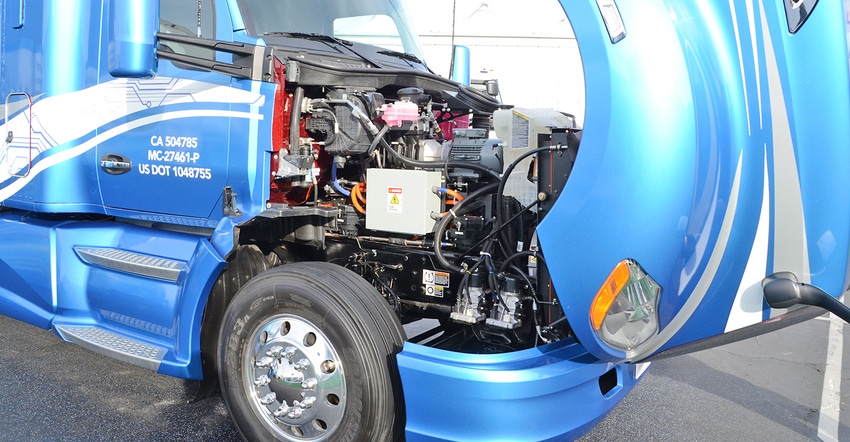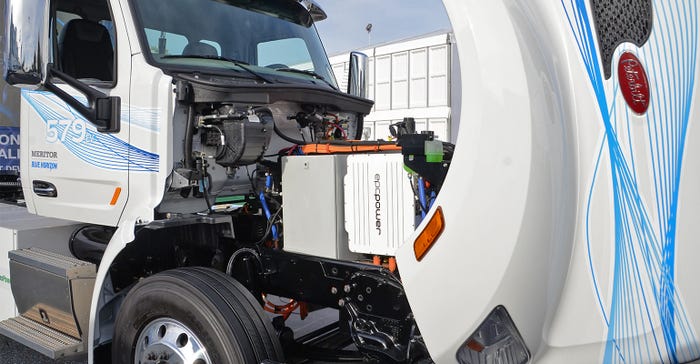February 6, 2019

A trip to a high-tech convention and trade show can be full of surprises, including the two truck rigs from Paccar sitting in the parking lot. Paccar, known for its Kenworth and Peterbilt brands, shared two prototype rigs that feature a common theme — zero emissions.
The age of the electric car continues to evolve, but the electric Class 8 truck? New idea, but these two prototypes show what’s possible for the future. While they won’t be coming to your farm anytime soon, the push to zero emissions is real; and, in a world where more goods move by truck, these machines do offer an interesting option.
Fuel cell features
Having a fuel cell as the energy source for an electric truck offers a key option that a fully electric system can�’t provide — quick refueling.
The Kenworth T680 Fuel Cell Electric Vehicle offers some interesting specs for the prospective future buyer. It is a prototype.
First, the rig has 560 hp in its traction power motor. The company notes the truck can maintain 30 mph on a 6% grade. That’s significant if it can make that speed under those conditions, and it shows the torque this electric motor has.
In fact, the machine boasts enough torque to start out on a 20% grade.
The truck has a 300-mile range before refueling; and while that’s a lot less than a standard diesel, this Class 8 tractor does offer the quick refill time for its fuel cell energy source. That fuel cell provides the needed “battery power” for the electric motor.
This is a hydrogen fuel cell that Paccar is developing in cooperation with Toyota. In fact, it carries the Toyota name along with the Kenworth brand — at least in this prototype on display.
With a fuel cell, hydrogen and air work through a system with an anode and cathode, along with an electrolyte, to create electricity. The only emission from this system is water.
The system has been engineered to fit into a standard cab.
Given the quick refill ability — just pump in the hydrogen and go — this approach may be more acceptable for tractors working in and around major cities. Over the road, the 300-mile range may be a limit for some; that remains to be seen. At kenworth.com, you can see more information about this truck.

CHARGE THIS: Electric vehicles are showing up in the most interesting places these days. The Peterbilt 579EV joins other models in the brand’s electric vehicle development program.

Going all electric
The fuel cell electric version of the Paccar rig uses a quick-fill energy source, but there was also a Peterbilt on hand that was all electric.
The Peterbilt 579EV is an all-electric Class 8 vehicle that will join the company’s 220EV and 520EV to create a lineup of electric rigs. All are in development with the 579EV, the latest on display.
The truck features a Day Cab configuration with a battery-electric drive system from TransPower. This system uses energy from two large packs of lithium-ion batteries to meet propulsion and power requirements.
The 579EV has about 429 hp and 308 kilowatt-hours of storage capacity. That gives the rig about 130 miles of operating range — which might work for a rig hauling grain to town (though time will tell).
Battery recharge time for the rig is about four hours.
To maximize energy use, the rig features an automated manual transmission and a high-power onboard inverter-charger set.
For now, the truck is best suited for moving material in a port application, which can rely on starts and stops for regenerative braking (a feature popular on hybrid cars). Regenerative breaking transfers energy back into the battery packs and reduces the amount of brake pedal pressure required. That means a smoother, quieter ride.
The rig has a gross vehicle weight rating of 80,000 pounds. Learn more about this rig at peterbilt.com.
About the Author(s)
You May Also Like






